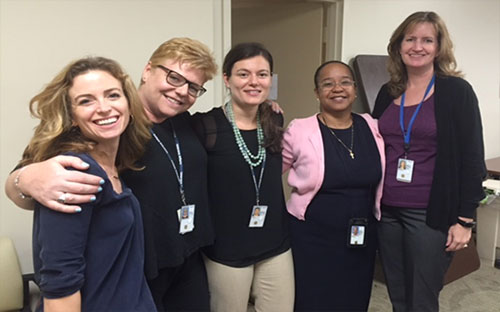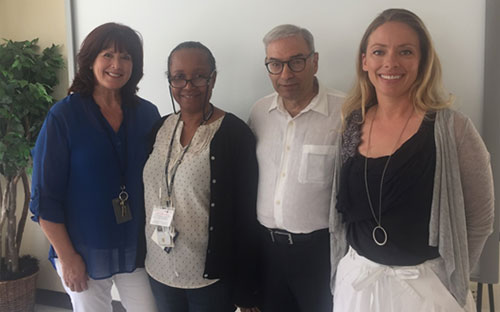 |
Tailoring VA's Diabetes Prevention Program to Women Veterans' NeedsHSR&D’s monthly publication Veterans’ Perspectives highlights research conducted by QUERI investigators, showcasing the importance of research for Veterans – and the importance of Veterans for research. In the July 2018 Issue:
|
IntroductionWhat is EMPOWER QUERI?The Enhancing Mental and Physical health of Women through Engagement and Retention (EMPOWER) QUERI Program works to improve women Veterans' engagement and retention in evidence-based care.When your blood sugar level is higher than normal but not yet high enough to be considered type 2 diabetes, you may have prediabetes, which affects more than one in three US adults. Prediabetes increases your chances of getting type 2 diabetes and can cause damage to your heart, blood vessels, and kidneys. However, not everyone’s condition will escalate to diabetes, and there are things we can all do to lower our risk. Participants in the Diabetes Prevention Program (DPP) Lifestyle Change Program lowered their chances of developing type 2 diabetes by 58% compared with participants who took a placebo. Thus, the Enhancing Mental and Physical Health of Women through Engagement and Retention (EMPOWER) QUERI program invited women Veterans with prediabetes to participate in a 12-month tailored, evidence-based, intensive DPP lifestyle intervention. Overweight/obese women Veterans (BMI>24 kg/m2) with prediabetes (HbA1c 5.7-6.4%) were offered the choice between either a tailored peer-led, in-person DPP, led by a Veteran peer-coach, or an online DPP intervention. Investigators then tracked participation data and conducted semi-structured interviews to assess engagement in and perceptions about the DPP modalities. A total of 119 women Veterans were enrolled in DPP (n=51 in-person, n=68 online), with enrollment rates exceeding expectations by almost three times. Participation and adherence were higher with online DPP; 64% of online participants vs. 25% of in-person participants completed >9 sessions/modules. Study investigators also conducted 38 interviews (18 during early implementation and 20 during post-implementation). Overall, the DPP content was well received, and most women were satisfied regardless of their modality choice. 
EMPOWER QUERI Leadership Team: (from left to right) Drs. Erin Finley, Alison Hamilton, Tannaz Moin, Bevanne Bean-Mayberry, and Melissa Farmer Coste. Veterans'Perspective
“...I learned what can cause you to have diabetes, and I never really understood that before. And it really, really helped me.” - Participating Veterans One woman Veteran who participated in the in-person group stated, “My experience was great with the program. I learned a lot of things about counting calories, how to read the ingredients, you know, on the back of food and stuff. I never knew before. I learned what can cause you to have diabetes, and I never really understood that before. And it really, really helped me.” A woman Veteran who participated in the online group stated, “It’s a very good and positive experience […] What I like about the program, it allows me to be more active and more involved, where instead of having someone say, ‘Eat this, eat this and this,’ they give us recipes or they’ll show us, you know, like a little meal plan and give us kind of suggestions.” Women Veterans also valued having a choice between in-person and online modalities, even if only one option was actually feasible (many online participants would have been unable to participate in-person, and many in-person participants would not have been able to participate online). One woman stated, “I think it’s an awesome choice, or else I wouldn’t have been able to participate.” Even those who preferred the in-person, peer-led DPP recognized that more women Veterans were able to participate because online DPP also was offered. For example, one woman stated, “To have a choice was important. It’s that I would’ve absolutely preferred in-person, but to have the choice was important because it’s good that you were trying to reach people that couldn’t otherwise come in-person, so that was nice.” And another woman said, “If it would have been in-person, I would have probably opted out, only because I wouldn’t be able to necessarily make it.” The Sisterhood“We all went through the same thing, and it was just like a sisterhood that I remember from the military.” - Participating Veteran Women Veterans also valued gender-specific groups because of increased comfort, camaraderie, and support. For example, one woman Veteran stated, “When you have other people that are experiencing the same experiences, then it’s just a little bit more like, ‘Okay, I’m not going through it by myself, or alone – I’m not alone.’” Many women Veterans cited their shared military background and the opportunity to meet and spend time with other women Veterans as an important factor for engagement. As one participant stated, “We all went through the same thing, and it was just like a sisterhood that I remember from the military.” One participant who was asked what she liked most about the program replied that she liked, “Everything. Meeting the other ladies and hearing their stories and [the coach] when she would tell us her story. The camaraderie with the other Veteran women, in particular, and being able to be open.” Women Veterans also discussed discomfort with male-dominated groups and gender-specific barriers to weight loss. One participant said, “I think [a women-only group] is important because our needs are more specific,” while another Veteran said, “I really, really like that it’s only women; that you could talk and be open and not feel uncomfortable, because sometimes as a woman you don’t want to talk [about] certain stuff around a man, and you don’t feel comfortable with your body type.” 
Coaches: (from left to right) Ms. Dorothy Bernard, RD (Registered Dietician); Ms. Jackie Lewis (Veteran), and EMPOWER analysis team members Art Kress, RD, and Karen Dyer, PhD.. Overall, QUERI study investigators found that providing women Veterans with a modality choice and gender-specific groups were important factors for engagement in an intensive lifestyle change intervention to lower their risk of type 2 diabetes. Tailoring DPP intervention delivery to better meet the needs and preferences of women Veterans can help enhance ongoing national efforts to address the growing diabetes epidemic. For more information about EMPOWER or this particular study, please contact Tannaz Moin, MD, MBA, MSHS, at Tannaz.Moin@va.gov or tmoin@mednet.ucla.edu. |